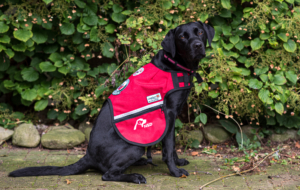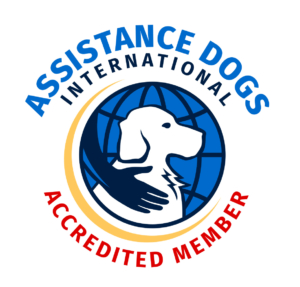Research shows the benefit of assistance dogs for Veterans with PTSD
A new review of evidence-based studies has shown the benefits of PTSD Assistance (Service) Dogs. Similar results were seen across seven scientific studies; veterans paired with PTSD assistance dogs benefitted from moderate to significant decreases in PTSD symptoms. These results were comparable to gold-standard trials of trauma interventions supported by the US Department of Veterans Affairs.
scientific studies; veterans paired with PTSD assistance dogs benefitted from moderate to significant decreases in PTSD symptoms. These results were comparable to gold-standard trials of trauma interventions supported by the US Department of Veterans Affairs.
“Assistance dogs improve the lives of countless thousands of veterans around the world by helping with practical tasks, enhancing independence, and boosting wellbeing, dignity and confidence,” said Chris Diefenthaler, Executive Director of Assistance Dogs International (ADI). “These studies indicate that properly trained assistance dogs are both life-saving and life-changing for veterans suffering from PTSD. They are proof that assistance dogs have a major role to play in the treatment, rehabilitation and support of military veterans with severe combat trauma.”
Eleven assistance dog programs, including eight ADI accredited programs, participated in these studies throughout the last 5 years. These teams included veterans who were matched with fully-trained assistance dogs and veterans who were learning how to train assistance dogs themselves. Furthermore, the studies were conducted by behavioural scientists, military psychologists, public health experts and social workers and all reported a reduction in PTSD symptoms after veterans completed service dog handling instruction. Two additional studies were conducted to document the long-term effects seen in these pairings and again noted strong decreases in PTSD symptoms. Researchers reported that “veterans benefit significantly from dog ownership in combination with a structured dog training program. Not only do they experience significant decreases in stress and post-traumatic stress symptoms but also they experience less isolation and self-judgment while also experiencing significant improvements in self-compassion.”
 Researchers in one study noted “a statistically significant decrease in PTSD and depression symptoms…participants reported significant reductions in anger and improvement in perceived social support and quality of life.” Another study working with veterans being treated for chronic severe combat trauma used eye-tracking technology to measure the psychological effect of training a young assistance dog. They found a correlation between the amount of time in close contact with the dog, and how much they paid more attention to “pleasant” images over threatening ones.
Researchers in one study noted “a statistically significant decrease in PTSD and depression symptoms…participants reported significant reductions in anger and improvement in perceived social support and quality of life.” Another study working with veterans being treated for chronic severe combat trauma used eye-tracking technology to measure the psychological effect of training a young assistance dog. They found a correlation between the amount of time in close contact with the dog, and how much they paid more attention to “pleasant” images over threatening ones.
A subset of these studies utilized control groups to compare treatment-only plans to the use of an assistance dog. Once again, the data showed individuals with an assistance dog had greater symptom reduction than those without.
“The scientific evidence is conclusive,” said Rick Yount, Founder and Executive Director of ADI member Warrior Canine Connection. “These seven scientific examinations provide the long-awaited evidence that assistance dogs are both popular and effective at reducing trauma symptoms and improving the quality of life for our veterans. They also indicate that partnering with an assistant dog can enhance the perception of standard trauma treatment. PTSD is projected to remain a chronic and debilitating condition for thousands of veterans. It is imperative that assistance dogs for veterans with PTSD be fully integrated into military and veteran trauma care.”
NSD’s executive director and co-founder, Danielle Forbes noted “The evidence has been building over the last decade and has become undeniable; assistance dogs profoundly impact the lives of veterans. PTSD Assistance Dogs enhance the mental health and wellbeing of the individuals they are matched with; as well as, the family unit as a whole by decreasing trauma symptoms, facilitating moderate, long-lasting reductions in depression symptoms, reducing stress and anxiety, promoting positive interactions in the home and the greater community and allowing the whole family to engage in activities of daily living that many of us take for granted. National Service Dogs is proud to support Canadian Veterans and their families through our life-changing assistance dogs.”
Notes:
The seven peer-reviewed studies covered by the review are:
Bergen-Cico, D., Smith, Y., Wolford, K., Gooley, C., Hannon, K., Woodruff, R., … Gump, B. (2018). Dog Ownership and Training Reduces Post-Traumatic Stress Symptoms and Increases Self-Compassion Among Veterans: Results of a Longitudinal Control Study. The Journal of Alternative and Complementary Medicine, 24(12), 1166–1175. http://doi.org/10.1089/acm.2018.0179
O’Haire, M.E. and K.E. Rodriguez (2018). Preliminary efficacy of service dogs as a complementary treatment for post traumatic stress disorder in a population of military veterans. Journal of Consulting and Clinical Psychology, Vol. 28, No. 2. 179-188. https://www.ncbi.nlm.nih.gov/pmc/articles/PMC5788288/
Whitworth, J.D., Scotland-Coogan, D., & Wharton, T., (April, 2019) Service dog training programs for veterans with PTSD: results of a pilot controlled study, Soc. Work Health Care, vol. 58, no. 4, pp. 412–430. https://pubmed.ncbi.nlm.nih.gov/30875483/
Woodward, S. H., Jamison, A. L., Gala, S., & Holmes, T. H. (2017). Canine companionship is associated with modification of attentional bias in post traumatic stress disorder. PLoS ONE, 12(10), e0179912. http://doi.org/10.1371/journal.pone.0179912
Kloep, M., Hunter, R., & Kertz, S. (2017). Examining the Effects of a Novel Training Program and Use of Psychiatric Service Dogs for Military-Related PTSD and Associated Symptoms. Am J Orthopsychiatry, 87(4), 425–433. http://doi.org/10.1037/ort0000254
Preetha A. Abraham, Josh B. Kazman, Joshua A. Bonner, Meg D. Olmert, Rick A. Yount & Patricia A. Deuster (2021) Effects of training service dogs on service members with PTSD: A pilot-feasibility randomized study with mixed methods, Military Psychology, https://www.tandfonline.com/doi/full/10.1080/08995605.2021.1984126
Yarborough, B. J. H, Owen-Smith, A. A., Stumbo, S. P., Yarborough, M. T., Perrin, N.A., & Green, C. A. (Jul. 2017) An Observational Study of Service Dogs for Veterans With Post traumatic Stress Disorder, Psychiatry. Serv., vol. 68, no. 7, pp. 730–734. https://ps.psychiatryonline.org/doi/10.1176/appi.ps.201500383
The ADI accredited programs involved are:
K9s For Warriors www.K9sforwarriors.org
Paws For Purple Hearts www.pawsforpurplehearts.org
Warrior Canine Connection www.warriorcanineconnection.org
Paws Assisting Veterans (PAVE) www.paveusa.org
Joys of Living Assistance Dogs (JLAD) https://www.joydogs.org
Bergin University of Canine Studies www.berginu.edu
Paws for People www.paws4people.org
Clear Paths for Veterans http://www.clearpath4vets.com (candidate program)





